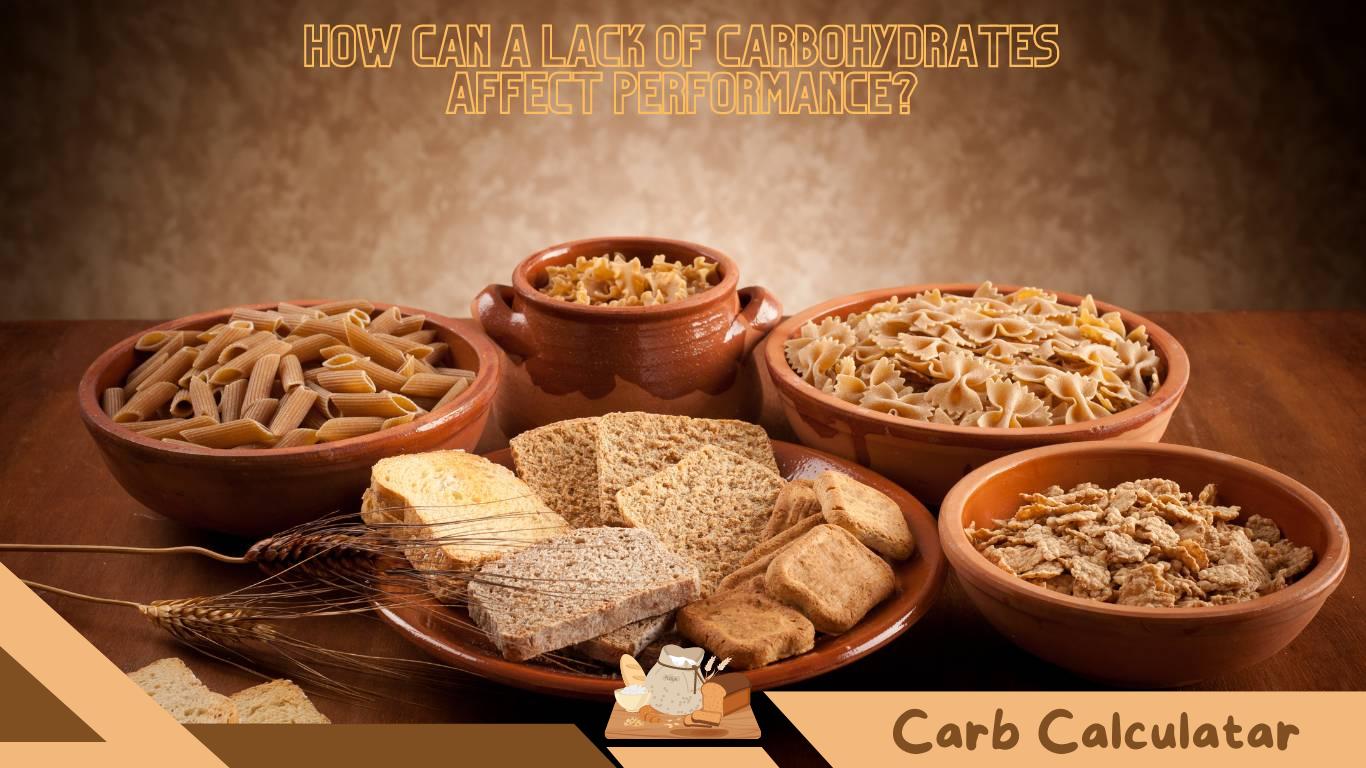How Can a Lack of Carbohydrates Affect Performance?

Carbohydrates are crucial in fueling the body and are a vital energy source. They are the essential nutrient that gives our body energy to do things. Carbs are turned into glucose, which the body uses for energy. We need energy for daily activities, exercise, and doing well in sports.
Carbohydrates give quick energy to the body. Athletes and people doing high-intensity workouts need them. They are essential for activities that require endurance and sustained effort. Eating enough carbs helps you perform better and avoid feeling tired. It gives your body the fuel it needs to work correctly.
Overview of the Impact of Carbohydrates on Performance
The impact of carbohydrates on performance is significant. Carbs give energy and affect how the body works. This impacts performance too. The availability of carbohydrates in the body affects endurance, strength, and cognitive function.
When you exercise, your body turns carbs into glycogen, saving it in your muscles and liver. These glycogen stores act as a readily available fuel source during exercise. When your body runs out of glycogen, it can affect how well you perform. This can cause you to feel tired, with low energy levels and less endurance.
Furthermore, carbohydrates are essential for optimal brain function. The brain needs the energy to work. It gets this energy from glucose in carbohydrates. Inadequate carbohydrate intake can impair cognitive function, affecting focus, concentration, and decision-making abilities. Sports performance can suffer when your mind isn’t focused and decisions are slow.
Understanding Carbohydrates
Carbohydrates, proteins, and fats are the body’s three macronutrients. Carbohydrates are the primary source of energy in the body. Carbs become glucose and go to cells to give you power. Glucose is necessary for body parts that always need energy, like the brain, muscles, and red blood cells.
Different Types of Carbohydrates and Their Roles
Carbohydrates can be classified into two main types: simple carbohydrates and complex carbohydrates. Sugars, or simple carbohydrates, are sugars in fruit, honey, and candy. Carbohydrates are made of simple sugar molecules. The body quickly absorbs them to provide fast energy.
Complex carbohydrates are also known as starches. They’re found in whole grains, legumes, and starchy veggies. Carbohydrates can be simple or complex. Complex ones have many sugar molecules and take more time to digest. This gives you energy for a longer time.
Both simple and complex carbohydrates have their roles in supporting performance. Simple carbs give quick energy. They’re helpful for intense physical activities or when you need immediate power. Carbs come in different types. Complex ones take longer to digest and give you energy for longer, which is excellent for endurance activities.
Daily Carbohydrate Intake for Optimal Performance
Eating the right carbs daily is essential to perform your best. How many carbs you need depends on your activity level, body size, and personal goals. Most people should get 45-65% of their calories from carbs each day. Athletes and those who train hard need more carbs to maintain energy levels. You may also like to read: How Long Before Sport Should You Eat Carbs?
Talk to a dietitian or sports nutritionist to know how much carbs to eat. They can help you determine your needs based on your goals and training. These experts can give you advice on how to eat carbs to do better and recover faster after exercise.
Effects of Low Carbohydrate Intake on Performance
1: Quick Energy Provided by Carbohydrates
Carbohydrates are the body’s preferred and most efficient source of energy. When you don’t eat enough carbs, your body doesn’t have enough glucose for energy. When you don’t get enough rest, you may feel tired and have less energy when you exercise. When your body doesn’t have enough carbohydrates, it can’t produce energy very quickly. It has to use protein or fat instead, which is slower and not good.
2: Impact of Low Carbohydrate Intake on Endurance Activities
When you do endurance activities like running or cycling for a long time, your muscles and liver need a lot of glycogen to keep you going. Glycogen is stored carbs that give you energy when you exercise for a long time. Not eating enough carbs can tire you and reduce how long you can do endurance activities. This happens because your body doesn’t have enough glycogen to keep going.
Impaired Cognitive Function
1: Brain’s Reliance on Carbohydrates for Energy
The brain is highly dependent on glucose as its primary source of energy. When carbohydrate intake is limited, the brain’s energy supply becomes compromised. This can make it harder to think clearly. It can affect your ability to focus, remember things, and make decisions. Athletes and people who play sports that require quick thinking may perform better if they eat enough carbs for their brains.
2: Effects of Limited Carbohydrates on Focus and Decision-Making
Carbohydrates play a crucial role in maintaining optimal brain function. Research shows that your brain can’t produce enough neurotransmitters when you don’t eat enough carbs. This can mess up the balance of essential chemicals in your brain, making it harder to focus and make good decisions. Split-second decisions and mental sharpness are crucial in sports performance. This can have a significant effect.
Muscle Glycogen Depletion and Reduced Strength
1: Why Your Muscles Need Carbs
When you work out hard or do strength training, your muscles rely on something called glycogen for energy. Carbs are like the fuel that keeps this glycogen tank full. If you don’t eat enough carbs, your muscles can’t get the energy they need, and this can make them weaker, with less stamina. That means your strength, power, and how well you do in sports can all be godown.
2: What Happens When You Don’t Get Enough Carbs
Carbs are super important for muscle strength because they help save your muscles. Without enough carbs, your body might start using your muscle proteins for energy instead. This can make your muscles smaller and weaker, which isn’t good for your strength. So, remember to eat your carbs if you want your muscles to stay strong!

Carbohydrates and Sports Performance
1: How to Fuel Up Before and During Sports
When athletes have a big endurance event coming up, they often use a trick called “carb loading.” This means they eat lots of carbohydrates in the days before the event to fill up their energy tanks (glycogen stores). They can get these carbs from foods like pasta, rice, bread, and fruits. During the event itself, athletes can snack on things like energy gels, drinks, or snacks to keep their energy levels up.
2: Why Carbs Are a Must for Long Workouts
For athletes doing long, tough workouts, having enough carbs is super important. Carbs give quick energy, so they can keep going and not run out of glycogen (their energy fuel). This is especially vital for long races like marathons, triathlons, or bike races.
Carbohydrates and Recovery
1: Recharging with Carbs After Exercise
After a workout, it’s crucial to eat carbs to refill those glycogen stores you used up during exercise. The best time to do this is within the first hour after exercising. You can get your carbs from things like sports drinks, fruits, and snacks made from whole grains.
2: Finding the Right Mix of Carbs and Protein
Besides carbs, protein is also important for recovery. Combining carbs with protein after a workout helps muscles recover and repair. A good mix is having about three to four grams of carbs for every gram of protein. This combo helps refill glycogen, build muscle, and heal tissues.
So, remember, for sports, carbs are your friend! Eat them before, during, and after to perform at your best. If you’re not sure how to plan your nutrition for sports, it’s a good idea to talk to a sports nutrition expert to create a plan that fits your goals.
Diet Tips for Better Performance
To boost your performance, it’s crucial to include foods rich in carbohydrates in your diet. You can enjoy whole grains, fruits, veggies, beans, potatoes, and corn. These foods provide good carbs that keep your energy levels steady, allowing you to perform at your peak. Having meals and snacks with plenty of carbs helps ensure you have enough energy for physical activities.
Balancing What You Eat for Top Performance
Carbs are important, but you need to balance all the nutrients to perform your best. Protein helps your muscles grow, and healthy fats help your body absorb nutrients. Eating good protein sources like chicken, fish, and beans, along with healthy fats from foods like avocados, nuts, and olive oil, keeps your muscles strong, supports overall health, and boosts your performance. The right mix of carbs, protein, and fats can vary depending on your body and goals.
Timing Your Carb Intake for Better Performance
When you eat carbs can make a big difference in your performance. Having carbs before you exercise gives you quick energy during your activity. Try to eat a meal or snack rich in carbs 1-3 hours before you work out or compete. If your activity lasts a long time, it’s a good idea to eat carbs regularly. You can have energy gels and sports drinks to help keep your blood sugar stable and give you more energy. Eating carbs within the first hour after you exercise helps your body recover faster.
Conclusion:
Improving your performance with food requires you to focus on carbs, have a balanced diet, and eat carbs at the correct times. Carbs give energy for the body to move. Eating foods with lots of carbs is essential to keep energy levels high. It’s necessary to balance your food groups. Add enough protein and healthy fats for better performance and to recover well. To get the most energy and refill glycogen after exercising, eat carbs before, during, and after. A dietitian or nutritionist can give you diet advice for better performance.
FAQs:
How much carbohydrate should I consume before exercise?
Before exercising, the amount of carbs to eat can change. This depends on how hard and long you’ll exercise and how your body takes in carbs. Try eating a meal or snack 1-3 hours before exercise with 1-4 grams of carbs for every kilogram you weigh.
Can I consume too many carbohydrates?
Eating too many carbs without exercising can make you gain weight. It’s crucial to balance how many carbs you eat based on your calorie needs and activity.
Are all carbohydrates the same?
Carbohydrates are simple (sugars) or complex (starches). Whole grains, legumes, and vegetables contain complex carbohydrates suitable for your health. They provide energy for longer because they have more fiber and take longer to digest.
Is it necessary to consume carbohydrates during shorter workouts?
You might not need to eat carbs during shorter or low-intensity workouts. Eating enough carbs daily to maintain energy and perform well is still important.




